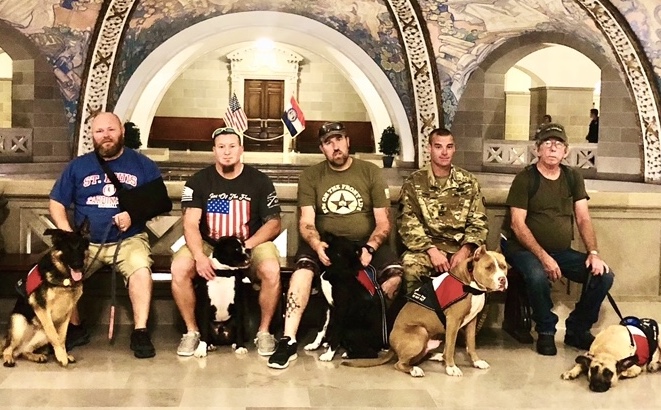The only reason K9s on The Front Line exists as an organization is the brutal toll PTSD exacts on tens of thousands of combat Veterans returning from their overseas deployments, and their experiences with the standard of care the VA offers them. A well researched article is worth reading: “Why the V.A. won’t pay for service dogs to treat PTSD”. Several years and millions of taxpayer dollars have been spent to concisely gauge the benefits of a trained Service K9 specific to PTSD – with no results and no forward movement.
But why, you might ask? Dr. Hagen Blaszyk, Co-Founder of K9s on The Front Line, has spent his career studying a plethora of health care problems and reported the findings in a wide range of medical journals. He is the first to admit to the challenge of rigorously measuring the impact these Service Dogs have. PTSD is a heterogeneous, poorly understood symptom complex manifesting in even more heterogeneous and complex individuals as the result of emotional trauma and moral injury. Then, factor in the immense variabilities in K9 temperaments, different training methods, supporting infrastructure, and the difficulty of designing even basic case-control studies becomes apparent. And how would you deal with the ethical dilemma of denying a potentially lifesaving intervention to Veterans randomized into a hypothetical control cohort?
We are not letting the VA off the hook though.
What we do goes well beyond ‘just’ providing lifesaving K9s to these warriors. Our intervention is successful at a minuscule fraction of cost we as a nation currently pay for mental health care of this Veteran population. K9s on The Front Line has taken more than 150 Veterans through our program, often with amazing outcomes. Post-intervention self-assessment shows a median reduction in PTSD symptom severity of 50%, which will last for years. Many Veterans who previously self-medicated with alcohol stopped drinking altogether, others were able to either reduce or completely discontinue psychotropic prescription medication. All our Veteran graduates reported the return of hope to their lives, for many a first after years of silent suffering. Sometimes, a Service Dog allowed other treatment modalities to be considered and pursued. There is no single silver bullet.
What we DO know, and CAN measure is that 20+ Veterans commit suicide EVERY SINGLE DAY. Each loss of life represents a casualty of war on our own soil. Lest we forget the negative ripple effect each loss will trigger – our Veterans are members of our communities; they are loved by family and friends. Each Veteran suicide then transfers the trauma of war to those who loved that Veteran the most. The problem becomes bigger, not smaller. So, what should we do about it?
To this day, physicians don’t fully understand how or even why anesthesia works. Yet thousands of patients use it happily every single day, as the alternative would be too painful (no pun intended). Why? Patient’s claims of no pain during hours of surgery have been accepted as strong evidence, even though these could be viewed as anecdotal stories. No clinical trial has ever been proposed to study pain levels during surgery, with or without anesthesia. Similarly, we still have no good understanding why and how Tylenol works, yet each week approximately 52 million U.S. adults use it. Why?
“Why dogs?” is a question we are commonly asked; and we typically reply with: “Because it works!”. That there remain mysteries in understanding anesthesia or Tylenol, yet people willingly use them because of their widely accepted benefits should serve as precedent. Carefully selected Veterans could catch a glimmer of hope and not end their lives. Testimonials from a number of our Veteran graduates speak volumes, and their aggregated ‘anecdotal’ attestations are proving that PTSD Service Dogs are a cost-effective intervention delivering significant, measurable outcomes.

share





